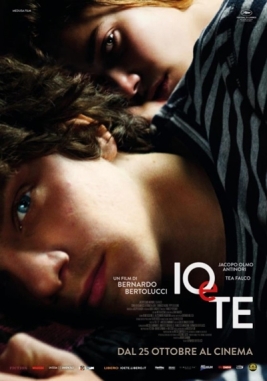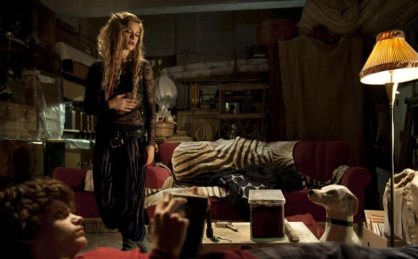 With its drama mostly unfolding in the cellar of a high-rise in Rome, Me and You (Io e te ) probably stands as legendary Italian director Bernardo Bertolucci slightest drama. But, beyond setting, the film is also slight in another way: it will not stand as one of his great films. Maybe it’s the many years waiting for the film’s arrival (his last was 2003’s The Dreamers) or the fact that this was supposed to be his first experiment with 3D film, which he later reneged on (Variety article). It all feels a bit anti-climactic, though the film is by no means a waste of time.
With its drama mostly unfolding in the cellar of a high-rise in Rome, Me and You (Io e te ) probably stands as legendary Italian director Bernardo Bertolucci slightest drama. But, beyond setting, the film is also slight in another way: it will not stand as one of his great films. Maybe it’s the many years waiting for the film’s arrival (his last was 2003’s The Dreamers) or the fact that this was supposed to be his first experiment with 3D film, which he later reneged on (Variety article). It all feels a bit anti-climactic, though the film is by no means a waste of time.
The film follows 14-year-old Lorenzo (Jacopo Olmo Antinori) who, after scamming his mother into thinking he’s on a school ski trip, secretly moves into the basement for a week. All he wants is to hide away from people, his only company being an ant farm. Then his 25-year-old half-sister Olivia (Tea Falco) crashes his party after stumbling upon him by accident. She thinks she has found the perfect spot to beat her heroin addiction and go cold turkey. He is upset with being bullied into sharing his solitude with someone he doesn’t care for much or even know that well. In their self-imposed purgatory, the two are forced to confront old grudges and come to terms with them and maybe leave their confinement with a sense compassion for one other.
Antinori resigns to his role as a newly pubescent young man, channeling a natural teen angst heightened on a superficial level by his pimply complexion and virginal mustache. The emphasis on his appearance is enhanced by the fact that we first meet him with his face turned downward during a session with a psychologist. Meanwhile, Olivia first appears in the shadows of the basement in a giant, woolly black coat out of an Edward Gorey cartoon. These enigmatic introductions beg for the audience’s projection, but in the end, the two become stereotypes: the withdrawn, socially awkward teenage boy caught between childhood and adulthood and the beautiful aspiring artist who is never taken seriously because of her good looks and her drug habit.
These are difficult roles to flesh out with the nuance demanded of them, but Bertolucci still musters performances from the actors that at least do not make the characters feel obnoxious. Both Antinori and Falco are making debut lead appearances as virtual unknowns in the cinema world, which again adds to the characters’ relatable quality. But on the other hand, the story is so intimate it begs for stronger performances. It does not help that the script feels a bit rote, based on the novel by Niccolò Ammaniti, who is one of four other  screenwriters, including Bertolucci. The material demands a more personal hand, and though there are moments of conflict and reconciliation, it all feels so mechanical that it hardly leaves you with the haunting impression the film aspires to achieve. Some of it even feels forced and unconvincing, like a scene at dinner when Lorenzo asks his mother if, after some cataclysmic event happens to wipe out all of humanity except them, would she volunteer to re-populate the world with him (Bertolucci will never shake his penchant for incest).
screenwriters, including Bertolucci. The material demands a more personal hand, and though there are moments of conflict and reconciliation, it all feels so mechanical that it hardly leaves you with the haunting impression the film aspires to achieve. Some of it even feels forced and unconvincing, like a scene at dinner when Lorenzo asks his mother if, after some cataclysmic event happens to wipe out all of humanity except them, would she volunteer to re-populate the world with him (Bertolucci will never shake his penchant for incest).
Though the film is sumptuously shot, featuring outstanding art direction, the camera sometimes feels a bit aimless. You can almost imagine the swooping and twirling camera movements used during a few early establishing shots were conceived when Bertolucci was aiming to make a 3D film. Also, the manner in which the camera drifts and twirls around enhances a feeling that the director is acting without a sense of assured control, feeling out the film more that feeling confident about his shots.
The film’s drama drives along with some close calls of the two being caught, Olivia screaming in the pangs of withdrawal and throwing up between moments of sharing her dreams and better times of living it up, as a rapt Lorenzo pays close attention and throws out casual questions that also speak to his fear of socializing. The climax of the drama comes with a David Bowie song, “Ragazzo Solo, Ragazza Sola” (“Lonely Boy, Lonely Girl”), which is actually the music of “Space Oddity” with Italian lyrics. Though Bowie sings the lyrics, they have nothing to do with his original lyrics inspired by the first moon landing. However, the Italian lyrics (by Italian lyricist Mogol) fit the film’s story better than “Space Oddity” ever would. As translated in the subtitles Olivia sings to Lorenzo:
Now lonely boy where will you go?
The night is a big sea
If you need my hand to swim
Thank you but tonight I would like to die
Because you know in my eyes
There is an angel, an angel that now does not fly any more
Yes, Me and You is a small drama, but it has some pretty moments. It just does not make for a whole, consistent experience. The most extreme action comes from scenes of Olivia throwing up. Still, she and Lorenzo eventually build a relationship where they can look beyond bitterness and accept their bond. It’s no surprise, but it’s also an example of how slight and indulgent art cinema can get. There’s a hint of suspense that nothing is permanent, and you are left hoping something will work out with these two, but then you’ll also just go on and forget this film soon enough. It probably would have been more interesting in 3D.
Me and You runs 97 minutes, is in Italian with English subtitles and is not rated (it features mature language and drug references, however). It opens in South Florida as part of the on-going “Cinema Made In Italy” series on Wednesday, Aug. 13, at the Miami Beach Cinematheque, which provided a preview screener for the purpose of this review. It runs through Aug. 21 (see Calendar here). It opens a few days later at the Cosford Cinema in Coral Gables, on Aug. 15 (see dates and times). For a look at other theater dates around the world, visit this webpage.


